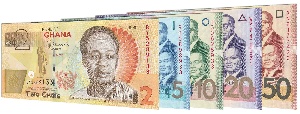- Home - News
- Elections 2024
- News Archive
- Crime & Punishment
- Politics
- Regional
- Editorial
- Health
- Ghanaians Abroad
- Tabloid
- Africa
- Religion
- Photo Archives
- Press Release
General News of Wednesday, 21 May 2025
Source: www.ghanawebbers.com
Ghana Cedi's strength, falling inflation defy global economic unease
Ghana Cedi's Remarkable Performance
The Ghana cedi is now one of the best-performing currencies globally. It has appreciated by about 16% against the U.S. dollar. This rise coincides with a drop in Ghana's inflation rate, which fell to 21.2% in April 2025.
Global Implications
The cedi's strengthening is an unusual case in international finance. A strong currency can influence trade dynamics for Ghana. It may make exports more competitive and change import costs. For foreign investors, a stable currency signals an attractive investment environment. This could lead to increased foreign direct investment in Ghana.
However, this situation presents both opportunities and challenges for global markets. Careful examination of the forces behind this trend is necessary.
Experts from major banks like Goldman Sachs and JP Morgan are monitoring Ghana’s fiscal policy and external debt levels. They want to see if this stabilization can last long-term. Institutions like the World Bank and IMF are particularly interested in emerging market economies like Ghana.
African Perspectives
Across Africa, the cedi's performance is closely watched. A strong currency can have mixed effects on regional economies. It symbolizes potential economic transformation and effective policy management on the continent.
The African Development Bank (AfDB) praised Ghana’s progress recently. Their report noted that "Ghana's macroeconomic stabilization efforts" are yielding positive results, contributing to the cedi's appreciation and lower inflation rates. However, they warn that structural reforms are essential for diversifying Ghana’s economy.
Increased regional integration under the African Continental Free Trade Area (AfCFTA) could further enhance trade balance and growth for Ghana.
United States Angle
For the United States, a rising cedi has less direct impact but remains significant. A stronger cedi makes U.S. imports into Ghana more expensive while reducing export values from Ghana to the U.S., affecting trade balances.
Despite this, overall U.S.-Ghana trade remains small but growing. Key U.S exports include machinery, vehicles, and agricultural products—areas likely affected by a stronger cedi.
U.S businesses with investments in Ghana may benefit as local purchasing power increases due to a stronger cedi.
Ghana's Domestic Scene
In Ghana, the strengthening cedi directly affects living costs as imports become cheaper. This likely contributed to lowering inflation from over 40% last year to 21.2% in April 2025.
Lower costs will help businesses relying on imported materials but may hurt exporters due to reduced competitiveness abroad.
Ghana’s Ministry of Trade recognizes these dual effects and promotes policies for export diversification while enhancing industry competitiveness amid currency appreciation.
They plan measures such as tax rebates and support for finding new markets to cushion exporters' impacts while managing public expectations about economic stability.
The Role of Gold Board
Debate continues over why the cedi has appreciated so much recently. The newly inaugurated Ghana Gold Board (GoldBod) is credited by Finance Minister Dr. Cassiel Ato Forson as key to this performance.
Dr. Forson stated that GoldBod contributes significantly through gold reserve accumulation since its inception.
GoldBod aims to formalize gold trading among small-scale miners while boosting foreign exchange reserves—factors he claims have driven a 6.7% rise in the cedi year-to-date as of May 13, 2025.
He also highlighted fiscal consolidation initiatives as crucial for maintaining stability in the cedi’s value over time.
Opposition Views
Former MP Kennedy Agyapong offers a different perspective on recent developments affecting Ghana’s economy negatively due to global conditions influenced by past administrations like Trump's era.
He argues that current stability stems partly from historical global financial structures rather than solely domestic actions—a view suggesting outside forces shape economic outcomes significantly.
Economists have noted how international commodity prices affect the value of currencies like the cedi—especially regarding gold and cocoa exports critical for Ghana’s economy.
Independent observers advocate for recognizing both domestic policies' tolls alongside global economic influences when assessing currency strength.
Evidence of Strengthening Cedi
The International Monetary Fund (IMF) noted that improved investor sentiment supports recent gains in the cedi's value linked with government fiscal commitments.
This suggests both domestic policies and international factors drive currency performance positively.
Additionally, IMF assistance totaling $3 billion helps bolster investor confidence through clear criteria aimed at managing deficits and inflation effectively.
Recent data confirms that year-on-year inflation dropped from 22.4% in March 2025 to 21.2% in April—a sign reinforcing positive trends alongside currency appreciation.
A comprehensive analysis comparing these trends with neighboring countries would provide deeper insights into how well the cedi performs overall.
While GoldBod plays a significant role currently, broader international movements also impact trade interactions involving commodities like gold or cocoa crucial for economic health.
Rising gold prices internationally have boosted export revenues significantly—strengthening foreign exchange reserves further enhances demand for local currency.
Monitoring sustainability will be vital moving forward; understanding implications on long-term development goals remains essential as stakeholders observe these changes closely.











